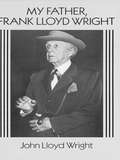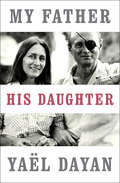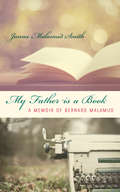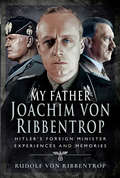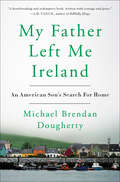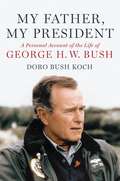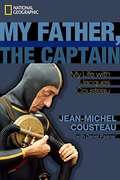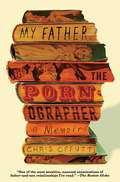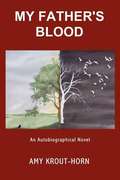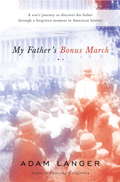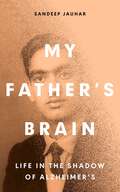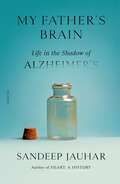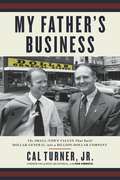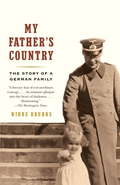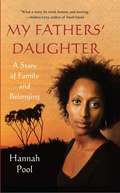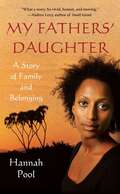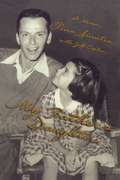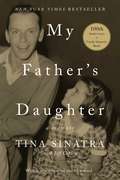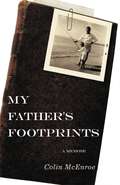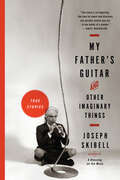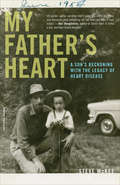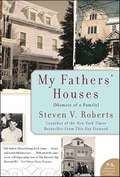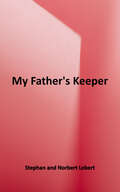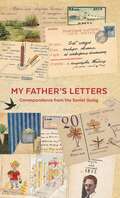- Table View
- List View
My Father, Frank Lloyd Wright
by John Lloyd Wright"An anecdotal reminiscence of America's chief living genius by his son -- short, unconventional, amusing and on the whole revealing." -- Book Week.Frank Lloyd Wright is widely regarded as the twentieth century's greatest architect -- an unconventional genius who transformed both residential and commercial building design with his concept of "organic" architecture. During a long and productive life, Wright designed some 800 buildings, received scores of honors and awards, and left an indelible imprint on modern architectural theory and practice.In this charming, readable memoir, Wright the architect and father comes to life through the vivid recollections and firsthand knowledge of his son. John Lloyd Wright characterizes his father as "a rebel, a jolt to civilization, whose romantic theme -- purposive planning and organic unity in inventing and combining forms -- is an epoch in the architecture of the world." His unique view of the "epoch" will intrigue architects, students, and all who admire the work of this visionary and uncompromising spirit. An added attraction of this volume is the inclusion of the complete text of William C. Gannet's The House Beautiful, an extremely rare work designed and printed by Frank Lloyd Wright.
My Father, His Daughter
by Yaël DayanA life of one of Israel's greatest heroes, as seen through his daughter's eyes Moshe Dayan was one of the greatest military leaders in Israel's short history. A child of the first kibbutz movement in British Palestine, he went on to lead Israel to victory in the 1948 War of Independence and to liberate Jerusalem in the 1967 Six-Day War. Dayan was not only a soldier but a politician, an archaeologist, and a larger-than-life figure who helped shape the state of Israel. In My Father, His Daughter, Yaël Dayan, who herself served in the Israeli Parliament, shares an uncensored look into her father's life and her own conflicted relationship with him. With poignancy and candor, Dayan creates a profound yet nuanced profile of her father. She relates his strong national pride, his boldness in dealing with other world leaders, and his troubles at home to his disintegrating marriage and multiple affairs. As revealing as My Father, His Daughter is of the man behind the myth, it is also a snapshot of a loving relationship between Yaël and Moshe Dayan, and of a daughter's admiration and respect for a complicated but loving father.
My Father is a Book: A Memoir of Bernard Malamud
by Janna Malamud SmithBernard Malamud was one of the most accomplished American novelists of the postwar years. From the Pulitzer Prize winner The Fixer as well as The Assistant, named one of the best "100 All-Time Novels" by Time Magazine-to mention only two of the more than a dozen published books-he not only established himself in the first rank of American writers but also took the country's literature in new and important directions.In her signature memoir, Smith explores her renowned father's life and literary legacy. Malamud was among the most brilliant novelists of his era, and counted among his friends Philip Roth, Saul Bellow, Theodore Roethke, and Shirley Jackson. Yet Malamud was also very private. Only his family has had full access to his personal papers, including letters and journals that offer unique insight into the man and his work. In her candid, evocative, and loving memoir, his daughter brings Malamud to vivid life.
My Father Joachim von Ribbentrop: Hitler's Foreign Minister, Experiences and Memories
by Rudolf von RibbentropIn this memoir, the son of Nazi Germany&’s foreign minister looks back on his life, examining their relationship and his father&’s role in World War II. On 16 October 1946, Joachim von Ribbentrop, Hitler&’s wartime Foreign Minister, was executed at Nuremberg, convicted on four counts including deliberately planning a war of aggression and war crimes. In this first English language edition of his memoirs, Rudolf von Ribbentrop candidly describes his relationship with his father when he was the German Ambassador in London and during the war years. Von Ribbentrop was an often-isolated figure among the Nazi elite. In his final report from London, von Ribbentrop informed Hitler that he was convinced Great Britain would fight for its position in the world. He went on to play a key role forging the short-lived pact with Stalin&’s Soviet Union. Far from being uncritical, the author sets out to paint an objective picture of his father&’s role. His unique position sheds light on the unfolding dramatic events leading up to, and then the execution of, the Second World war. While the author briefly describes his personal experiences including his war service with the SS, it is the insight this work provides into top level decision making at the heart of the Third Reich that will appeal most to both historians and laymen.
My Father Left Me Ireland: An American Son's Search For Home
by Michael Brendan DoughertyNational Review senior writer Michael Brendan Dougherty delivers a meditation on belonging, fatherhood, and nationalism, through a series of letters to his estranged Irish father.The child of an Irish man and an Irish-American woman who split up before he was born, Michael Brendan Dougherty grew up with an acute sense of absence. He was raised in New Jersey by his hard-working single mother, who gave him a passion for Ireland, the land of her roots and the home of Michael's father. She put him to bed using little phrases in the Irish language, sang traditional songs, and filled their home with a romantic vision of a homeland over the horizon. Every few years, his father returned from Dublin for a visit, but those encounters were never long enough. Devastated by his father's departures, Michael eventually consoled himself by believing that fatherhood was best understood as a check in the mail. Wearied by the Irish kitsch of the 1990s, he began to reject his mother's Irish nationalism as a romantic myth.Years later, when Michael found out that he would soon be a father himself, he could no longer afford to be jaded; he would need to tell his daughter who she is and where she comes from. He immediately re-immersed himself in the biographies of firebrands like Patrick Pearse and studied the Irish language. And he decided to reconnect with the man who had left him behind, and the nation just over the horizon. He began writing letters to his father about what he remembered, missed, and longed for. Those letters would become this book.Along the way, Michael realized that his longings were shared by many Americans of every ethnicity and background. So many of us these days lack a clear sense of our cultural origins or even a vocabulary for expressing this lack--so we avoid talking about our roots altogether. As a result, the traditional sense of pride has started to feel foreign and dangerous; we've become great consumers of cultural kitsch, but useless conservators of our true history. In these deeply felt and fascinating letters, Dougherty goes beyond his family's story to share a fascinating meditation on the meaning of identity in America.
My Father, My President: A Personal Account of the Life of George H. W. Bush
by Doro Bush KochWhen George H. W. Bush asked Doro to write this memoir, she contacted hundreds of his friends and associates; conducted scores of interviews with dignitaries including Bill Clinton, Mikhail Gorbachev, and General Colin Powell; tapped the memories of family members, including her mother, her four brothers, and of course, her father himself; and collected information from the former president's never-before-released files. "Now for the first time, a complete portrait of George H. W. Bush emerges. Doro reveals her father as a young man courting his future wife, Barbara, and how the death of their first daughter brought them closer. Doro tells how they raised five children through much of her father's long and storied career in public service, and offers details about this tenures as head of the Republication National Committee during Watergate, ambassador to the U.N., America's liaison to China, and vice president for eight years under Ronald Reagan." "Doro also provides an insider's look at how the 41st president dealt with crises and challenges, all while keeping his humor and personality intact, and how he still does so while aiding victims of the 2004 tsunami and Hurricane Katrina. She shows how he felt when two of his sons entered politics - and when his eldest made it to the top - and sheds new light on his friendship with former rival Bill Clinton."--BOOK JACKET.
My Father, My President: A Personal Account of the Life of George H. W. Bush
by Doro Bush KochWhen George H. W. Bush asked Doro to write this memoir, she contacted hundreds of his friends and associates; conducted scores of interviews with dignitaries including Bill Clinton, Mikhail Gorbachev, and General Colin Powell; tapped the memories of family members, including her mother, her four brothers, and of course, her father himself; and collected information from the former president's never-before-released files. "Now for the first time, a complete portrait of George H. W. Bush emerges. Doro reveals her father as a young man courting his future wife, Barbara, and how the death of their first daughter brought them closer. Doro tells how they raised five children through much of her father's long and storied career in public service, and offers details about this tenures as head of the Republication National Committee during Watergate, ambassador to the U.N., America's liaison to China, and vice president for eight years under Ronald Reagan." "Doro also provides an insider's look at how the 41st president dealt with crises and challenges, all while keeping his humor and personality intact, and how he still does so while aiding victims of the 2004 tsunami and Hurricane Katrina. She shows how he felt when two of his sons entered politics - and when his eldest made it to the top - and sheds new light on his friendship with former rival Bill Clinton."--BOOK JACKET.
My Father, the Captain
by Jean-Michel Cousteau Daniel PaisnerSuch a gift he has given to me! Such an inheritance! . . . I notice an unusual opening in the kelp. All around there is this dense and marvelous kelp forest, which appears to collect around a silky, sandy bottom. The way it appears before me, at just that moment, is almost otherworldly. The sun's rays are shining brightly through the kelp, lighting up this little, inexplicable patch of sand-like a spotlight on an empty stage. All around me there are tiny garibaldi, brightly colored damselfish native to the area. In normal light, they're a fantastic, shimmering orange, but here, in this bright sunlight, they are like festive candles, a string of party decorations announcing some underwater fiesta.
My Father, the Pornographer
by Chris OffuttAfter inheriting 400 novels of pornography written by his father in the 1970s and '80s, critically acclaimed author Chris Offutt sets out to make sense of a complicated father-son relationship in this carefully observed, beautifully written memoir."Chris Offutt owns one of the finest, surest prose styles around, ready and able to convey the hardest truth without flinching. Now Offutt enters the darkest and most mysterious of places--the cave of a monstrous enigma named Andrew J. Offutt--armed with nothing but his own restless curiosity. Spoiler alert: He makes it out alive, walking into the daylight to bring us a deeper, funnier, more tender and more heartbroken truth--and his masterpiece." --Michael Chabon When Andrew Offutt died, his son, Chris, inherited a desk, a rifle, and eighteen hundred pounds of pornographic fiction. Andrew had been considered the "king of twentieth-century smut," with a writing career that began as a strategy to pay for his son's orthodontic needs and soon took on a life of its own, peaking during the 1970s when the commercial popularity of the erotic novel reached its height. With his dutiful wife serving as typist, Andrew wrote from their home in the Kentucky hills, locked away in an office no one dared intrude upon. In this fashion he wrote more than four hundred novels, including pirate porn, ghost porn, zombie porn, and secret agent porn. The more he wrote, the more intense his ambition became and the more difficult it was for his children to be part of his world. Over the long summer of 2013, Chris returned to his hometown to help his widowed mother move out of his childhood home. As he began to examine his father's manuscripts and memorabilia, journals, and letters, he realized he finally had an opportunity to gain insight into the difficult, mercurial, sometimes cruel man he'd loved and feared in equal measure. Only in his father's absence could he truly make sense of the man and his legacy. In My Father, the Pornographer, Offutt takes us on the journey with him, reading his father's prodigious literary output as both a critic and as a son seeking answers. This is a book about the life of a working writer who supports his family solely by the output of his typewriter; it's about the awful psychic burdens one generation unthinkingly passes along to the next; and it's about growing up in the Appalachian hills with a pack of fearless boys riding bicycles through the woods, happy and free.
My Father's Blood
by Amy Krout-Horn"Darkness: the place where light best reveals itself." In the potent and poignant language of fine literature, this stunningly honest autobiographical novel grants candid views of chronic illness, blindness, and Native American racial identity, against the backdrop of a world often determined to demean, degrade, and disenfranchise. Though Amy Krout-Horn's inheritance brings illness, it also brings strong medicine, medicine remembered on a cellular level, derived from the profound wisdom of her Lakota ancestors. But can the ancient council fire's "spark" that ignited within a young girl's heart continue to guide the woman, even as the monster drags her into the "darkest darkness"? Like the reverberations of a native drum, Amy Krout-Horn's visceral voice resounds, imparting the message that, sometimes, our bloodlines become our lifelines.
My Father's Bonus March
by Adam LangerTo his friends, Seymour Langer was one of the brightest kids to emerge from Chicago's Depression-era Jewish West Side. To his family, he was a driven and dedicated physician, a devoted father and husband. But to his Adam, youngest son, Seymour was also an enigma: a somewhat distant figure to whom Adam could never quite measure up, a worldly man who never left the city of Chicago during the last third of his life, a would-be author who spoke for years of writing a history of the Bonus March of 1932, when twenty thousand World War I veterans descended on the nation's capital to demand compensation. Using this dramatic but overlooked event in U.S. history as a means of understanding his relationship with his father, Adam Langer sets out to uncover why the Bonus March intrigued Seymour Langer, whose personal history seemed to be artfully obscured by a mix of evasiveness and exaggeration. The author interweaves the story of the Bonus March and interviews with such individuals as history aficionado Senator John Kerry and the writer and critic Norman Podhoretz with his own reminiscences and those of his father's relatives, colleagues, and contemporaries. In the process, he explores the nature of memory while creating a moving, multilayered portrait of both his father and his father's generation.From the Hardcover edition.
My Father's Brain: Understanding Life in the Shadow of Alzheimer's
by Sandeep JauharA son's journey through his father's dementia. As a cardiologist, Sandeep Jauhar is trained to think logically and dispassionately about medical problems, and primed to offer his patients reassurance and solutions. But when his father is diagnosed with Alzheimer&’s there are no magic treatments or miracle drugs – only the promise of unstoppable decline. For years Jauhar watches his father undergo a distressing transformation. Once a prominent research geneticist and author, he now repeats questions over and over, forgets what he has eaten for breakfast, makes baffling financial decisions and turns into a liability behind the wheel. Jauhar investigates the science of dementia and what actually happens in the brain as we age and our memory falters, uncovering the history of Alzheimer&’s from first discovery to the most cutting-edge research, and whether modern treatments offer any hope in a global crisis. A blend of science, history and memoir, My Father&’s Brain is a brutally honest and moving account of how Jauhar and his siblings grappled every day with some of life&’s toughest questions.
My Father's Brain: Life in the Shadow of Alzheimer's
by Sandeep JauharNamed a best book of the year by The New Yorker | A Smithsonian top ten science book of 2023 | One of AARP magazine's favorite books of 2023“Blending the humor, compassion, and absorbing family drama of first-rate memoir with expert science writing, [Sandeep Jauhar] has composed a can’t-miss introduction to what has been called the Age of Alzheimer’s.” —Sanjay Gupta, author of Keep Sharp and World War CA deeply affecting memoir of a father’s descent into dementia, and a revelatory inquiry into why the human brain degenerates with age and what we can do about it.Almost six million Americans—about one in every ten people over the age of sixty-five—have Alzheimer’s disease or a related dementia, and this number is projected to more than double by 2050. What is it like to live with and amid this increasingly prevalent condition, an affliction that some fear more than death? In My Father’s Brain, the distinguished physician and author Sandeep Jauhar sets his father’s struggle with Alzheimer’s alongside his own journey toward understanding this disease and how it might best be coped with, if not cured.In an intimate memoir rich with humor and heartbreak, Jauhar relates how his immigrant father and extended family felt, quarreled, and found their way through the dissolution of a cherished life. Along the way, he lucidly exposes what happens in the brain as we age and our memory falters, and explores everything from ancient conceptions of the mind to the most cutting-edge neurological—and bioethical—research. Throughout, My Father’s Brain confronts the moral and psychological concerns that arise when family members must become caregivers, when children’s and parents’ roles reverse, and when we must accept unforeseen turns in our closest relationships—and in our understanding of what it is to have a self. The result is a work of essential insight into dementia, and into how scientists, caregivers, and all of us in an aging society are reckoning with the fallout.
My Father's Business: The Small-Town Values That Built Dollar General into a Billion-Dollar Company
by Cal Turner Rob Simbeck"This classic story told through the eyes of my friend Cal Jr. is instructive in almost every area of life. I simply could not put it down. Must-read!"-Dave Ramsey, bestselling author and nationally syndicated radio show hostThe first-person account of the family that changed the American retail landscape. Longtime Dollar General CEO Cal Turner, Jr. shares his extraordinary life as heir to the company founded by his father, Cal Turner, Sr., and his grandfather, a dirt farmer turned Depression-era entrepreneur. Cal's narrative is at its heart a father-son story, from his childhood in Scottsville, Kentucky, where business and family were one, to the triumph of reaching the Fortune 300--at the cost of risking that very father/son relationship. Cal shares how the small-town values with which he was raised helped him guide Dollar General from family enterprise to national powerhouse. Chronicling three generations of a successful family with very different leadership styles, Cal Jr. shares a wealth of wisdom from a lifetime on the entrepreneurial front lines. He shows how his grandfather turned a third-grade education into an asset for success. He reveals how his driven father hatched the game-changing dollar price point strategy and why it worked. And he explains how he found his own leadership style when he took his place at the helm--values-based, people-oriented, and pragmatic. Cal's story provides a riveting look at the family love and drama behind Dollar General's spectacular rise, pays homage to the working-class people whose no-frills needs helped determine its rock-bottom prices, and shares the life and lessons of one of America's most compelling business leaders.
My Father's Country
by Wibke BruhnsTHIS BOOK POSES DIFFICULT QUESTIONS ABOUT WHAT IT WAS TO BE GERMAN UNDER THE NAZIS. How would you have behaved as a typical German living in the Third Reich?What would your 'moral choices' have been, and would you have acted upon them?In August 1944, Hans Georg Klamroth was tried and executed for his part in the 20 July plot to assassinate Hitler. Wibke Bruhns, his youngest daughter, was six years old at the time. Decades later, watching a documentary about the events of 20 July, images of her father in the Third Reich People's Court appeared on the screen. 'I stare at this man with the lifeless expression. I don't know him... But I can see myself in him - his eyes are my eyes, I know that I look like him... I wouldn't be me, without him. ' In My Father's Country, Bruhns tells of her search for her father. Returning to Halberstadt in Northern Germany, where her ancestors the Klamroth family lived and worked for generations, she retraces the story from Kaiser Wilhelm to the end of World War Two, discovering old photographs, letters and diaries, which she uses to piece together a unique and unforgettable family epic. Engaging with her family on both an emotional and political level, My Father's Country is a memoir that is also a remarkable work of history, powerfully told and deeply moving.
My Fathers' Daughter: A Story of Family and Belonging
by Hannah PoolWhat do you wear to meet your father for the first time? In 2004, Hannah Pool knew more about next season's lipstick colors than she did about Africa: a beauty editor for The Guardian newspaper, she juggled lattes and cocktails, handbags and hangouts through her twenties just like any other beautiful, independent Londoner. Her white, English adoptive relatives were beloved to her and were all the family she needed. Okay, if I treat it as a first date, then I'm on home turf. What image do I want to put across?...Classic, rather than trendy, and if my G-string doesn't pop out, I should be able to carry the whole thing off. Contacted by relatives she didn't know she had, she decided to visit Eritrea, the war-torn African country of her birth, and answer for herself the daunting questions every adopted child asks. Imagine what it's like to never have seen another woman or man from your own family. To spend your life looking for clues in the faces of strangers...We all need to know why we were given up. What Hannah Pool learned on her journey forms a narrative of insight, wisdom, wit, and warmth beyond all expectations. When I stepped off the plane in Asmara, I had no idea what lay ahead, or how those events would change me, and if I'd thought about it too hard I probably wouldn't have gotten farther than the baggage claim. A story that will "send shivers down [your] spine," (The Bookseller), My Fathers' Daughter follows Hannah Pool's brave and heartbreaking return to Africa to meet the family she lost -- and the father she thought was dead.
My Fathers' Daughter: A Story of Family and Belonging
by Hannah PoolHannah Pool, a feature writer at The Guardian newspaper in London was born in the small African country of Eritrea in 1974 but her family, being unable to care for her, gave her to a white British couple for adoption shortly after her birth. This book describes her search for and visit to her birth family and her feelings before and after meeting them.
My Father's Daughter: A Memoir
by Tina SinatraFrank Sinatra seemed to have it all: genius, wealth, the love of beautiful women, glamorous friends from Las Vegas to the White House. But in this startling and remarkably outspoken memoir, his youngest daughter reveals to us an acutely restless, lonely and conflicted man. Through his marriages and front-page romances and the melancholy gaps between, Frank Sinatra searched for a contentment that eluded him. For the first time Tina writes candidly about the wedge his manipulative fourth wife, Barbara Marx, drove between father and daughter. MY FATHER'S DAUGHTER, with its unflinching account of Sinatra's flaws and foibles, will shock many of his fans. At the same time, it is a deeply affectionate portrait written with love and warmth, a celebration of a daughter's fond esteem for her father and a respect for his great legacy. The world remembers Frank Sinatra as one of the giants of the show business. In this book from someone inside the legend, Tina Sinatra remembers him as something more: a father, and a man.
My Father's Daughter: A Memoir
by Tina Sinatra Jeff CoplonCelebrating the 100th anniversary of Sinatra’s birth, a startling, compelling, yet affectionate portrait of an American entertainment legend by his youngest daughter, who writes about the man, his life, the accusations, and about the many people who surrounded him—wives, friends, lovers, users, and sycophants—from his Hoboken childhood through the notorious “Rat Pack,” and beyond.Frank Sinatra seemed to have it all: genius, wealth, the love of beautiful women, glamorous friends from Las Vegas to the White House. But in this startling and remarkably outspoken memoir, his youngest daughter reveals an acutely restless, lonely and conflicted man. Through his marriages and front-page romances and the melancholy gaps between, Frank Sinatra searched for a contentment that eluded him. Tina writes candidly about the wedge his manipulative fourth wife, Barbara Marx, drove between father and daughter.My Father’s Daughter, with its unflinching account of Sinatra’s flaws and foibles, will shock many of his fans. At the same time, it is a deeply affectionate portrait written with love and warmth, a celebration of a daughter’s fond esteem for her father and a respect for his great legacy. Even now, as we celebrate the 100th anniversary of his birth, the world remembers Frank Sinatra as one of the giants of the show business. In this book from someone inside the legend, Tina Sinatra remembers him as something more: a father, and a man.
My Father’s Footprints: A Memoir
by Colin McenroeStarting with the death of his father and chronicling backwards, the author examines their relationship in order to understand his dad, not just as a father, but as a man.
My Father's Guitar and Other Imaginary Things
by Joseph SkibellOften comic, sometimes tender, profoundly truthful, the pleasure in these nonfiction pieces by award-winning novelist Joseph Skibell is discovering along with the author that catastrophes, fantasies, and delusions are what give sweetness and shape to our lives. “As a writer,” Skibell has said, “I feel about life the way the people of the Plains felt about the buffalo: I want to use every part of it.” In My Father’s Guitar and Other Imaginary Things, his first nonfiction work, he mines the events of his own life to create a captivating collection of personal essays, a suite of intimate stories that blurs the line between funny and poignant, and between the imaginary and the real. Often improbable, these stories are 100 percent true. <P><P>Skibell misremembers the guitar his father promised him; together, he and a telemarketer dream of a better world; a major work of Holocaust art turns out to have been painted by his cousin. Woven together, the stories paint a complex portrait of a man and his family: a businessman father and an artistic son and the difficult love between them; complicated uncles, cousins, and sisters; a haunted house; and—of course—an imaginary guitar. Skibell’s novels have been praised as “startlingly original” (the Washington Post), “magical” (the New Yorker), and the work of “a gifted, committed imagination” (the New York Times). With his distinctive style, he has been referred to as “the bastard love child of Mark Twain, I. B. Singer, and Wes Anderson, left on a doorstep in Lubbock, Texas.”
My Father's Heart: A Son's Reckoning with the Legacy of Heart Disease
by Steve MckeeOn an autumn night in 1969, John McKee had a heart attack-an event that would end his life, and change his son Steve's forever. With heart disease being the number one cause of death among Americans, My Father's Heart is an extraordinary story of an all-too-ordinary scenario: A father dies, a son remains, and the loss casts a long shadow across a generation. Chronicling the disorienting first days following John McKee's death, this powerful memoir of love, forgiveness, and finding oneself is rich in evocative details of time, place, and family.
My Fathers' Houses: Memoir of a Family
by Steven V. RobertsFrom Steven V. Roberts comes My Fathers' Houses, a memoir of growing up in Bayonne, New Jersey, an immigrant community in the shadow of the Statue if Liberty, and the story of how his father and his grandfather's dreams–and their own passion for writing and ideas–influenced Steven's future, and inspired him to seek his fortune in New York City, the media capital of the world. This is a story of a town and a time and a boy who grew up there, a boy who became a New York Times correspondent, TV and radio personality, and best–selling author. The town was Bayonne, New Jersey, a European village so close to New York that Steve could see the Statue of Liberty from his bedroom window. The time was the forties and fifties, when children of immigrants were striving to become American and find a place in a booming post–war world. The core of Steve's world was one block, where he lived in a house his grandfather, Harry Schanbam, had built with his own hands. But the story starts back in Russia, where the family business of writing and ideas began. Steve's other grandfather, Abraham Rogowsky, stole money to become a Zionist pioneer in Palestine before moving to America. The tale continues through the Depression, when Steve's parents lived one block apart in Bayonne, wrote letters to each other and married in secret. During the war years, Steve's father wrote children's books and based one of his best sellers on outings he took with his twin sons to the local train station. As his byline, he used his boys' middle names–Jeffrey Victor–so Steve got his first writing credit before he was two. The story concludes with the boy leaving Bayonne, going on to Harvard, meeting the Catholic girl who became his wife, and starting work at the New York Times–across the river, and worlds away, from where he began. Now a grandfather of five, Steve Roberts looks in the mirror and sees his own father and grandfather looking back at him–a family chain that started in 19th century Russia and thrives today in 21st century America.
My Father's Keeper: Children of Nazi Leaders - An Intimate History of Damage and Denial
by Stephan Norbert LebertIn 1959 the German journalist Norbert Lebert interviewed the children of prominent Nazis: Hess, Bormann, Goring, Himmler, Baldur von Schirach (creator of the Hitler Youth), and Hans Frank (governor of Poland). Not knowing what to do with the interviews, he boxed them up and stored them. After Lebert's death, his son Stephan -- also a journalist -- inherited the files. Fascinated by what he found, he set out to re-interview the same people forty years later. Revisiting his father's subjects, Lebert explores how each of them deals with the agonizing question: What does it mean to have a father who participated in mass murder? For the most part, the Leberts found that the children remained intensely loyal to their fathers, regardless of their crimes. Gudrun Himmler, for example, lives in a Munich suburb under her husband's name, keeping secret contacts with other nostalgic Nazis. In fact, Niklas Frank is the only one who rejects his heritage. But when he writes in a popular German magazine of his rage against his father -- a man charged with two million deaths -- hundreds of letters pour in from outraged readers. Whatever your father did, they argue, fathers must always be honored. Remarkable in both its content and its narrative power, My Father's Keeper is an illuminating addition to the dark literature of the Nazi past -- and perhaps of any totalitarianism -- and of how this past continues to haunt the present.
My Father's Letters: Correspondence from the Soviet Gulag
by MemorialA profoundly moving and historical record—letters sent by sixteen fathers imprisoned in the Gulag camps to their children during the 1930s–1950s.&“They will live as human beings and die as human beings; and in this alone lies man&’s eternal and bitter victory over all the grandiose and inhuman forces that ever have been or will be.&” —Vasily Grossman, Life and FateBetween the 1930s and 1950s, millions of people were sent to the Gulag in the Soviet Union. My Father&’s Letters tells the stories of sixteen men—mostly members of the intelligentsia, and loyal Soviet subjects—who were imprisoned in the Gulag camps, through the letters they sent back to their wives and children. Here are letters illustrated by fathers keen to educate their children in science and natural history; the tragic missives of a former military man convinced that the terrible mistake of his arrest will be rectified; the &“letter&” stitched on a bedsheet with a fishbone and smuggled out of a maximum security camp. My Father&’s Letters is an immediate source of life in prison during Stalin&’s Great Terror. Almost none of the men writing these letters survived.&“My Father&’s Letters is well presented and deeply moving. The translation is fluent and all the necessary background information is clearly provided. Some passages conjure up the life of an individual family—and of an entire culture—with heart-breaking vividness.&” —Robert Chandler &“Astoundingly, these stories are not miserable. Yes, the men mention their inadequate shelter, clothing and food, but the overwhelming impact is the expression of their love for their families . . . My Father&’s Letters is beautifully produced.&” —Vin Arthey, Scotsman
